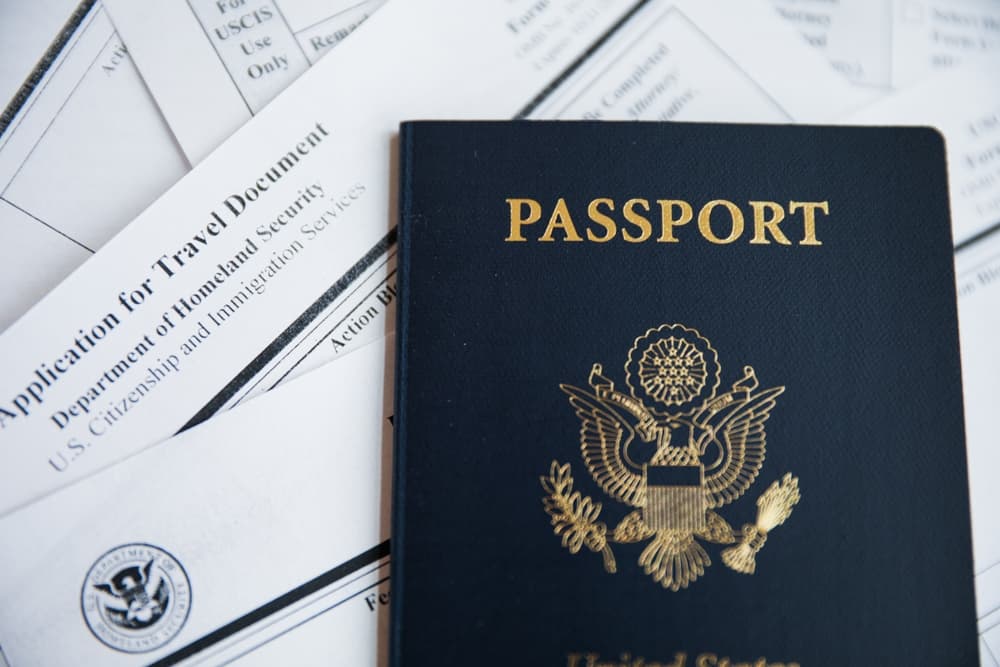If prosecutors charge you with or courts convict you of a DWI (Driving While Intoxicated) in Texas, you may wonder about the long-term consequences of this offense.
One common concern is how a DWI might affect your ability to travel internationally.
You might ask, "Does a Texas DWI show up on your passport?"
Abilene, TX, DWI defense attorney at Law Offices of David M. White, understand the importance of this question and want to provide you with information on the subject.
This blog will review the relationship between a Texas DWI and your passport, discuss the potential impacts on international travel—especially if you need to drive between Mexico and Texas, for example—and provide valuable insights to help you understand this complex issue.
Understanding Passports and Criminal Records

Before we discuss how a Texas DWI might affect your passport, it's worth understanding what information is typically included in a passport and how it relates to criminal records.
1. Passport Information:
A United States passport is an official government-issued document that is proof of identity and citizenship for international travel. The information contained in a passport includes:
- Full name
- Date of birth
- Place of birth
- Passport number
- Issue date and expiration date
- Photo of the passport holder
2. Criminal Records and Passports
Your passport itself does not contain information about your criminal history, including DWI convictions. The U.S. Department of State, which issues passports, does not include criminal record information directly on the passport document.
However, a DWI conviction will still affect your ability to travel internationally. While the conviction may not appear on your passport, it can still affect your travel plans in other ways.
The Direct Answer: Does a Texas DWI Show Up on Your Passport?
To address the main question directly: No, a Texas DWI does not show up on your passport. Your passport is a document that verifies your identity and citizenship, not a comprehensive record of your criminal history.
However, it's important to understand that this doesn't mean a DWI conviction won't affect your international travel plans. While the conviction itself isn't listed on your passport, there are several ways in which a DWI can impact your ability to travel abroad.
How a Texas DWI Can Affect International Travel

Although a DWI conviction doesn't appear on your passport, it can still have significant implications for international travel. Here are some ways a Texas DWI might affect your ability to travel abroad:
1. Passport Application and Renewal:
While a DWI conviction doesn't automatically disqualify you from obtaining or renewing a passport, there are situations where it might complicate the process:
- Probation Restrictions: If you're on probation for a DWI offense, your probation terms might include travel restrictions. In some cases, you may need permission from your probation officer or the court to apply for a passport or travel internationally.
- Outstanding Warrants: If you have any outstanding warrants related to your DWI case, this could lead to issues when applying for or renewing your passport.
- Felony DWI: In Texas, a third DWI offense is typically charged as a felony. Individuals with pending felony charges or those who are forbidden to leave the U.S. as a condition of parole or probation may face difficulties in obtaining a passport.
2. Entry Requirements for Foreign Countries:
Many countries have their own entry requirements and may deny entry to people with criminal records, including DWI convictions.
While this information isn't on your passport, foreign immigration officials ma find it through other means:
- Background Checks: Some countries conduct background checks on visitors, which may reveal a DWI conviction.
- Visa Applications: When applying for a visa to enter certain countries, you may be required to disclose criminal convictions, including DWIs.
- Border Control Questions: Immigration officials may ask about criminal history during the entry process, and providing false information can lead to severe consequences.
3. Specific Country Restrictions:
Some countries have particularly strict policies regarding DWI convictions:
- Canada: Canada is known for its stringent policies on DWI offenses. A DWI conviction can make you criminally inadmissible to Canada, potentially barring entry for several years after the offense.
- Mexico: While Mexico's policies are generally less strict than Canada's, a recent DWI conviction could still lead to entry denial.
- European Union: Countries in the EU may have varying policies, but generally, a single DWI conviction is less likely to cause issues unless it's recent or there are multiple offenses.
4. Enhanced Border Screening:
In some cases, individuals with DWI convictions may face additional screening or questioning at international borders, even if they ultimately may enter the country.
5. Commercial Driver's License (CDL) Implications
A DWI conviction can have severe consequences for those who hold a commercial driver's license, including potential suspension or revocation of the CDL. This can indirectly affect international travel for those whose work involves cross-border transportation.
Steps to Take If You Have a Texas DWI and Plan to Travel

If you have a DWI conviction in Texas and are planning to travel internationally:
- Consult an Attorney: Speak with an experienced DWI attorney, like those at the Law Offices of David M. White, to understand the full implications of your conviction and get advice on how it might affect your travel plans.
- Check Entry Requirements: Research the specific entry requirements for the countries you plan to visit. Pay close attention to any policies regarding criminal convictions and DWI offenses.
- Consider Applying for a Waiver: For countries with strict DWI policies, like Canada, you may be able to apply for a temporary resident permit or criminal rehabilitation to gain entry despite your conviction.
- Be Honest: Always be truthful when filling out visa applications or answering questions from border officials. Lying about a criminal conviction can result in more severe consequences than the conviction itself.
- Plan Ahead: If you're concerned about potential travel restrictions, allow extra time for visa applications and possible additional screening processes.
- Keep Documentation: Carry relevant documentation about your case, including court records showing that you've completed all required sentences or rehabilitation programs.
Long-Term Consequences and Rehabilitation
While a DWI conviction can have immediate impacts on your ability to travel, it's essential to consider the long-term consequences and opportunities for rehabilitation:
- Time and Rehabilitation: Many countries become less concerned about a DWI conviction as time passes, especially if you have no subsequent offenses. Completing all court-ordered requirements and maintaining a clean record can work in your favor.
- Expungement or Sealing of Records: In some cases, you may be eligible to have your DWI record expunged or sealed in Texas. This process can minimize the impact of your conviction on international travel. However, expungement options for DWI offenses in Texas are limited. Be sure to consult with an attorney about your specific situation.
- Demonstrating Reform: If you must disclose your DWI conviction when applying for a visa or entering a country, be prepared to provide evidence of rehabilitation, such as completion of alcohol education programs or voluntary community service.
- Professional Implications: A DWI conviction can have significant professional consequences for those whose careers involve international travel. Proactively address these issues with your employer and seek legal advice on mitigating the impact on your career.
Seek Legal Guidance for Your Texas DWI Concerns
At the Law Offices of David M. White, we understand DWI convictions and their potential effects on various aspects of your life, including international travel. If you face a DWI charge in Texas or worry about how a past conviction might affect your travel plans, seek experienced criminal defense lawyer.
Remember, each case is unique, and the laws surrounding DWI offenses and international travel can be complex and subject to change. If you have questions about your situation or need legal assistance with a DWI case in Texas, don't hesitate to contact us.
